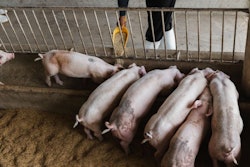
For the first time, African swine fever virus has been detected in South Africa’s KwaZulu-Natal province.
Over the past two months, new cases of African swine fever (ASF) have been officially confirmed in five of South Africa’s nine provinces.
Among those provinces reporting recent outbreaks is — for the first time — KwaZulu-Natal.
After 15 out of 87 pigs died at a farm there in early July, presence of the ASF virus was confirmed. This is according to a notification from the veterinary authority to World Organisation for Animal Health (WOAH). Source of the infection in the eastern province of KwaZulu-Natal is unknown.
Located in the district of Harry Gwale, the affected premises is outside the nation’s ASF control area. The district is in the south of KwaZulu-Natal, and borders Lesotho.
Also in the northeast of South Africa is Gauteng. In this province, five further ASF outbreaks have been confirmed with WOAH.
While one of these began in March — in the Johannesburg area — the others started between June 10 and the end of July. The more recent cases were confirmed as farms in the districts of Ekurhuleni, Sedibeng and West Rand. Affected were a village herd of 500 pigs, and four farms. Each of these comprised between 60 and 150 animals.
In each of the neighboring provinces of Free State and Mpumalanga, presence of the ASF virus was confirmed at one additional farm.
Meanwhile in the southwest of South Africa in Western Cape, the disease was confirmed at three more locations during June.
Since the start of the current ASF outbreak waves, the country’s authorities have registered a total of 179 outbreaks with WOAH. Some of these date back to 2019. Directly impacted have been almost 65,000 of the nation’s pigs in these provinces as well as Eastern Cape.
Zambia bans pork sales in city
For 14 days starting in late July, sales of pork were banned from Livingstone supermarkets and butchers in this East African state.
According to Daily Mail of Zambia, this move came after confirmation of ASF in the city, and was aimed at halting the spread of the virus. Ten pigs were reported to have died at a city school, and 13 more animals have been culled.
Located in the far south of the country, Livingstone is an important location for the tourist sector due to its proximity to Victoria Falls. It also forms part of the border with Zimbabwe.
In March, two ASF outbreaks were confirmed at veterinary camps in neighboring Lusaka province. This was according to a WOAH notification, which has not been updated since that time.
Nigerian state takes steps to keep out ASF
A new team has been set up in the state of Lagos to fight ASF.
Main aim of the new task force is to monitor for signs of the disease, reported The Nation Online last week.
An improved ASF surveillance plan is set to be implemented to improve an early warning system for pig farmers, according to the state agriculture commissioner
Some 300,000 pigs were killed in a single ASF outbreak back in 2020. Affected was the West African state’s largest pig farm. The Oke-Aro facility provided a living for 3,000 farmers, and supplied pork to more than 50 million people in the southwest of the country.
According to the same local source, presence of the ASF virus was confirmed at a farm in Ebonyi state in May. Around 400 pigs are reported to have died in this region in the southeast of Nigeria.
In June, ASF-related pig losses were reported to be mounting in the central state of Plateau.
Update on ASF in the Caribbean region
Since the 1980s, the Dominican Republic and Haiti had been free of ASF until last year. These two nations are located on the Greater Antilles island of Hispaniola.
While neither of these countries has recently registered new cases of the disease with WOAH, other states in the region remain on alert.
Among the actions taken to improve disease controls was a new online course to spread awareness of the disease in the Caribbean.
At the end of June, the United Nations’ Food and Agriculture Organization (FAO) announced it was making the information available for to the region’s veterinary personnel. Topics covered included diagnosis of the disease, investigation procedures, and how to respond in case of an outbreak.
Up to 300 people could participate simultaneously in the training. Expected to take around 15 hours, the course was made available by FAO for four weeks.
Also in Belize, authorities have initiated am awareness campaign among farmers about the threat of ASF. A training session was offered to farmers in the eastern district of Cayo, reported Breaking Belize News last week. With the aim of protecting the country’s US$30 million pig industry, a key area for the training was on the importance of maintaining high levels of biosecurity on pig farms.
Owing to the high risk of transmitting the ASF virus, the U.S. Embassy in the Dominican Republic issued a warning to travelers last week against bringing Dominican pork products into the U.S.
















